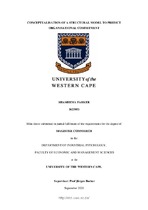| dc.contributor.advisor | Becker, Jürgen | |
| dc.contributor.author | Parker, Shameema | |
| dc.date.accessioned | 2021-03-26T09:16:33Z | |
| dc.date.available | 2021-03-26T09:16:33Z | |
| dc.date.issued | 2020 | |
| dc.identifier.uri | http://hdl.handle.net/11394/8065 | |
| dc.description | Magister Commercii (Industrial Psychology) - MCom(IPS) | en_US |
| dc.description.abstract | As local textile manufacturing come under pressure from global competition, the competitive advantage of organisations in this sector have become an important research topic. As a key input in the manufacturing process, human resources can either be a burdensome cost or a source of competitive advantage for organisations in the textile industry. The effectiveness of human resources depends to a large extend on the ability of organisations to keep them motivated and productive. | en_US |
| dc.language.iso | en | en_US |
| dc.publisher | University of Western Cape | en_US |
| dc.subject | Organisational commitment | en_US |
| dc.subject | Affective commitment | en_US |
| dc.subject | Normative commitment | en_US |
| dc.subject | Perceived organisational justice | en_US |
| dc.subject | Distributive justice | en_US |
| dc.title | Conceptualisation of a structural model to predict organisational commitment | en_US |
| dc.rights.holder | University of Western Cape | en_US |

